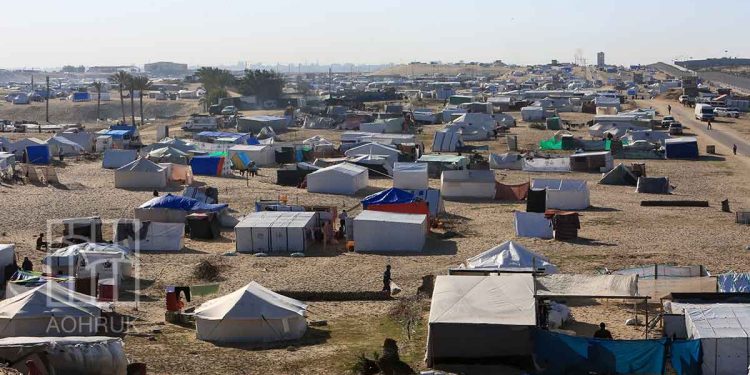Gaza is facing one of the harshest chapters in its modern humanitarian history, as the cold months draw near and hundreds of thousands of residents remain without proper shelter. Following two years of a devastating war of annihilation waged by the Israeli occupation, homes and infrastructure have been obliterated, leaving Gaza’s cities in ruins.
Tens of thousands of displaced families are now entering winter in tattered tents or half-destroyed houses, without electricity, heating, or clean water. With temperatures expected to drop and rainfall to increase, warnings are mounting over the spread of respiratory illnesses among children and the elderly, and the potential flooding of makeshift camps in low-lying areas.
In this context, Farhan Haq, Deputy Spokesperson for the UN Secretary-General, urged the need to step up shelter assistance before winter arrives, warning that conditions in the Strip “cannot withstand any further delay in humanitarian response.”
Haq said in a press statement that relief organisations are expanding operations in areas that were previously hard to reach, yet the scale of need far exceeds what is currently allowed to enter.
He explained that the UN has distributed only 300 tents and 14,700 blankets to displaced families in Khan Younis, which is a symbolic amount compared to the immense destruction caused by the assault. He stressed that the entry of far greater quantities of shelter materials is an urgent necessity to save lives.
Haq called on the occupation to allow unrestricted passage of aid and to issue immediate permits for humanitarian organisations working on the ground.
He added that UN teams have managed to bring 10,638 tonnes of essential supplies into Gaza since the ceasefire took effect. However, the “Gaza Government” stated that only 986 trucks had actually entered out of the 6,600 expected by Monday evening, a clear breach of the ceasefire terms, which stipulated the immediate and continuous entry of aid.
The ceasefire, which came into effect on 10 October, is based on a plan proposed by US President Donald Trump, involving a phased Israeli withdrawal, mutual prisoner releases, and the reopening of crossings for humanitarian supplies. Yet, the realities on the ground reveal continuing obstacles, rendering the agreement fragile amid worsening humanitarian conditions.
The war launched by the occupation on 8 October 2023 and lasting two years resulted in the killing of more than 68,000 Palestinians and the injury of 170,000 others, in a fully-fledged act of genocide. The systematic destruction, widespread targeting of civilians, and the blockade preventing food, medicine, and water all constitute, under the 1948 Convention on the Prevention and Punishment of the Crime of Genocide, acts intended to destroy a human group “in whole or in part.”
The occupation continues to impose crippling restrictions on the entry of construction and shelter materials, depriving thousands of families of the bare essentials of life, in a flagrant violation of international humanitarian law, particularly the Fourth Geneva Convention, which obliges the occupying power to protect civilians during wartime and ensure their basic needs.
Against this backdrop, the international response remains well below the level required. Mounting legal and moral obligations now fall upon the global community to compel the occupation to respect international humanitarian law and lift the blockade immediately to enable reconstruction and shelter before Gaza’s tragedy becomes yet another chapter of collective suffering beyond repair.


























